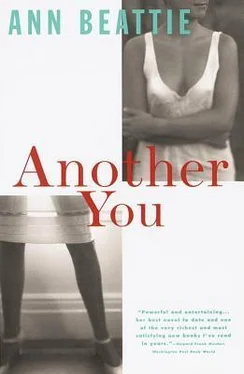Ann Beattie - Another You
Здесь есть возможность читать онлайн «Ann Beattie - Another You» весь текст электронной книги совершенно бесплатно (целиком полную версию без сокращений). В некоторых случаях можно слушать аудио, скачать через торрент в формате fb2 и присутствует краткое содержание. Год выпуска: 2014, Издательство: Vintage Books, Жанр: Современная проза, на английском языке. Описание произведения, (предисловие) а так же отзывы посетителей доступны на портале библиотеки ЛибКат.
- Название:Another You
- Автор:
- Издательство:Vintage Books
- Жанр:
- Год:2014
- ISBN:нет данных
- Рейтинг книги:5 / 5. Голосов: 1
-
Избранное:Добавить в избранное
- Отзывы:
-
Ваша оценка:
- 100
- 1
- 2
- 3
- 4
- 5
Another You: краткое содержание, описание и аннотация
Предлагаем к чтению аннотацию, описание, краткое содержание или предисловие (зависит от того, что написал сам автор книги «Another You»). Если вы не нашли необходимую информацию о книге — напишите в комментариях, мы постараемся отыскать её.
Another You — читать онлайн бесплатно полную книгу (весь текст) целиком
Ниже представлен текст книги, разбитый по страницам. Система сохранения места последней прочитанной страницы, позволяет с удобством читать онлайн бесплатно книгу «Another You», без необходимости каждый раз заново искать на чём Вы остановились. Поставьте закладку, и сможете в любой момент перейти на страницу, на которой закончили чтение.
Интервал:
Закладка:
“We terminated a couple of years ago. He was seeing one of the M.D.’s about the medication he was taking.”
“Forgive me,” he said, “but he didn’t give me the impression he knew anyone at student health, except that he knew of someone who had apparently upset a student who had certain … who believed, rightly or wrongly, that McCallum had done certain things to her. I thought that student needed help, but the therapist had, well, the therapist had apparently not been the picture of compassion when… ”
That smile again, but slighter. “I know the situation you’re referring to,” she said. “I’m aware of the determination regarding the therapeutic approach.”
“Therapeutic approach?”
“Yes,” Jenny Oughton said. “The student came for therapy.”
“I know she came, went, for therapy, but are you aware that she was extremely upset following her first session and that she didn’t return?”
“I did hear she didn’t return. Yes,” she said.
“Am I missing something here?”
“I don’t think you’re missing anything, per se.” She looked at him, no smile. “I understand your confusion,” she said. “I should add that I found myself with a conflict of interest when I was called in to consult. I no longer see clients privately, but I was called in as someone the therapist thought might offer some insight. I realized, then, that the client being discussed was describing a problem she felt had been caused by my former client. That might not have been definitive, in terms of my bowing out, except that more recently, Susan McCallum had been to see me. Susan McCallum was in treatment with someone else. Because of my going into research.” The smile, again. “I’d appreciate your keeping confidential my mention of Susan McCallum as a client. The situation was naturally very puzzling to you, so I told you.”
“Puzzling. Yes. Well. It was puzzling, yes,” he echoed. He was deliberately stalling for time, yet he wasn’t sure what might ideally happen: she might suddenly tell him everything about everyone, including, through her always infallible, omniscient view, what was true and what was a lie? Not a chance — and quite possibly, she didn’t know. She might give him, at the very least, some clue as to why, by implication, the puzzle had been in large part resolved by what she’d said? Did she think he saw things more clearly after what she’d told him? Had McCallum, in effect, set him up, knowing full well that it was not in his best interests that Livan Baker’s problem be analyzed at student health?
He watched as a heavy woman in a red coat walked down the hallway carrying a vase filled with red roses. He had begun to feel like someone pulled into an ongoing mystery, a passenger who’d happened to book a seat on the train the night an audience-participatory mystery was being staged. Or as if he were sitting in the front row, watching a bizarre comedy routine, and suddenly he had been pulled into the comic’s routine — exactly what had happened to him years before, at a comedy club in Portsmouth, with a spotlight on his face as he tried to appear good-natured about the comic’s insults. More bad-dream stuff: the anxiety dream of walking naked; the irrational conviction that he, alone, might be McCallum’s child’s savior; his obviously secondary position to Jenny Oughton and her world of what’s-taken-for-granted/what’s-helpful-to-know.
“What about this makes you feel genuinely helpless?” she said, her voice level, eyes filled with concern. My God — he must have spoken to her. She prompted: “The only person not part of the plot on the mystery train?”
“You know those games,” he said lamely.
“Yes. You feel that involving you in this, McCallum has tried to take away your autonomy?”
“I feel awkward about getting a freebie,” he said.
“Who’s giving you the freebie?”
He said: “Did you mean to send a bill?”
“No, I didn’t,” she said. “I thought I was paraphrasing what you’d said, so I could be sure I understood. I wasn’t entirely sure if you were speaking literally or metaphorically. I was trying to understand, not to offer an opinion.”
“You know, this is going to sound really strange, but I just realized that something I do to keep my distance from people is just what you do when you mean to communicate,” he said. “Conversationally, I mean. I often try to — it’s not paraphrase, exactly, it’s more a honed-down version of what the person has said. To see if the person still agrees with the statement in the simpler, or the starker, form.”
This caused a frown. “Aren’t those two rather different things?” she said. “I wouldn’t think of simplicity and starkness as being the same.”
“This is really a very strange conversation to be having in the waiting room of a hospital,” he said.
“You don’t want to address my observation.” Her eyes sparkled. She meant it mischievously, a satire of the shrink playing shrink.
“You don’t seriously want to keep this up,” he said.
“You think I’m so different? You don’t think it’s possible I ever find myself in the middle of things without having anticipated everything?” She shrugged. “I have a problem managing my intensity sometimes,” she said.
“What does that mean?”
“Do you want to know simply, or starkly?” she said. He hesitated.
“I mean that we might have locked into a conversational mode that has more to do with personality — our specific personalities vis-à-vis one another, and my intensity, in particular — than with any externals. We might be speaking this way regardless of the situation, is what I’m suggesting.”
“Do you think we would have talked this way if I’d kept our five o’clock appointment?”
“No,” she said. “I’m on my second wind.”
This made him laugh spontaneously, it was so little what he expected she’d answer. When he laughed, he was aware of the huge weight he had to lift off his chest to get more air into his lungs. That awareness took him back to the moment in the car when he had sat looking at the hospital; that had been the first moment he had registered the crushing weight, and suddenly he could remember how painful it had felt — his wondering how he would get out of the car and proceed, and the thought, as if perfectly logical, that he need not button the four buttons of his coat, but instead he could grab each side and close it over his front. All the better an image: the huddled man, braced against the wind, tears shaken from his eyes a response to the frigid wind, not tears of emotion.
This time, when he looked at her, he was convinced he had been speaking when he had not. He was convinced that he had let her in — ridiculous, but he meant it literally, not metaphorically — that she had been some airborne particle, and his coat had not been tightly held against him, so that she worked her way inside, the way mice find their way into walls in winter, the way cobwebs sometimes flutter onto your fingertips. He was thinking of her as a mouse? A cobweb? She was a real person, who must be contended with. Looking at him, as if they’d come full circle, with her eyes again narrowed so that he knew she saw him in sharp focus, and that she was waiting for something. He also knew what he wanted: he wanted her to be what she was not, a prophet, someone who could tell him, definitively, that McCallum would not die, the invincible authority figure he had always secretly questioned whether any therapist could be. Confronted with a smart, complex person, he had tried to make her a small, gray annoyance. Failing that, he had tried to see her as drooping tendrils of dust.
“Just between you and me. McCallum isn’t going to die, is he?” he said.
Читать дальшеИнтервал:
Закладка:
Похожие книги на «Another You»
Представляем Вашему вниманию похожие книги на «Another You» списком для выбора. Мы отобрали схожую по названию и смыслу литературу в надежде предоставить читателям больше вариантов отыскать новые, интересные, ещё непрочитанные произведения.
Обсуждение, отзывы о книге «Another You» и просто собственные мнения читателей. Оставьте ваши комментарии, напишите, что Вы думаете о произведении, его смысле или главных героях. Укажите что конкретно понравилось, а что нет, и почему Вы так считаете.












